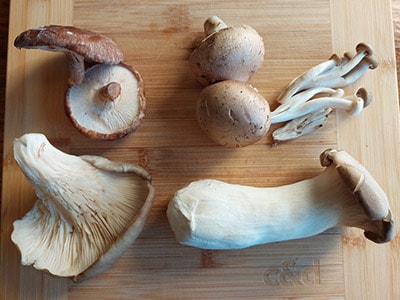
How to Manage Autoimmune Diseases with Mushrooms
Mushrooms are a diverse group of interesting and delicate fungi that have been eaten and used medicinally all over the world for centuries. Wild mushroom foraging means a great day out in the forest, but even the mushrooms purchased from your local market have immune stimulating effects.
Currently, the science behind the immune-stimulating effects of various mushrooms is rather basic. Rigorous literature reviews are difficult due to the various species tested, extraction methods used and parts consumed. However, lab tests show promising results for a broad range of edible mushrooms.
When it comes to managing autoimmune diseases, many studies stress the importance of beta-glucans in your diet. Beta-glucans are found in cereals as well as fungi. The problem, however, is that the beta-glucans found in fungi aren’t water-soluble which is why you should eat them instead of brewing them into tea. Mushrooms also contain small amounts of very specific lectins which regulate the immune system.
Even if you do not have an autoimmune disorder, you almost certainly know someone who does. According to the most recent statistics, millions of people worldwide suffer from an autoimmune disorder. Type 1 diabetes, multiple sclerosis, ulcerative colitis, lupus, Crohn’s or rheumatoid arthritis are just a few of the many diseases in which your immune system struggles to distinguish between your own cells and foreign invaders. Instead of protecting the body from outside threats, the immune system perceives the body as a threat and responds accordingly.
Eat Your Mushrooms
Consuming mushrooms is one of the best ways to manage autoimmune diseases via your diet. This is because when eaten, mushrooms act as a prebiotic in the large intestines, and research shows that their insoluble beta-glucans have a stronger immunostimulating effect than soluble glucans found in cereals. This is probably why mushrooms are considered a complementary treatment for chemotherapy.
Eating mushrooms also provides fiber, vitamins and minerals that are otherwise difficult to extract. But for some people, the texture of mushrooms is off-putting, so I would recommend powdered mushrooms instead. You get the same benefits without the slippery texture.
In the lab, it is possible to extract beta-glucans and other beneficial compounds from mushrooms, but this involves an enzyme extraction which makes it difficult to replicate at home.
Common Edible Mushrooms for Managing Autoimmune Diseases
- Porcini mushrooms (Boletus edulis) contain one of the few water-soluble glucans which triggered an immunomodulating response in mice.
- Button mushrooms (Agaricus bisporus) contain beneficial lectins and lectin-like proteins which have immunoregulating effects.
- Chanterelle mushrooms contain polysaccharides which regulate the immune response.
- Oyster mushrooms (Pleurotus ostreatus) contain beta-glucans and proteins which may have an immunoregulatory effect. They are well-studied and have numerous other health benefits.
- Straw mushrooms (Volvariella volvacea) contain a specific lectin which stimulates the immune system.
- Shiitake mushrooms (Lentinus edodes) has one of the highest concentrations of beta-glucans.
- Maitake mushrooms (Grifola frondosa) have soluble and insoluble beta-glucans which are both necessary to treat tumors.
- Winter mushrooms (Flammulina velutipes) trigger antibody production.
- Wood Ear mushrooms (Auricularia polytricha) contain an immunomodulating protein. It’s very common in China and dried mushrooms need to be soaked before cooking them.
- Reishi mushrooms (Ganoderma lucidum) increase the production of immunoglobulins and are easily purchased in powdered form.
If you would like to experience the power of medicinal mushrooms, visit the Apothecary for Nicole’s Mushroom Fourtress dual-extracted tincture bundle.
Raw or Cooked Mushrooms?
There is a general consensus that cooking your mushrooms tends to be better than raw. The two main reasons for this are chitin and agaritine. The cell walls of mushrooms are made of chitin which is too tough for our digestive system to breakdown, and freshly picked mushrooms contain some agaritine which is thought to be carcinogenic. When cooked, the chitin breaks down, releasing its nutrients and beneficial compounds, whereas the amount of agaritine decreases (agaritine also decreases when the mushroom is stored for a day or two).
On the other hand, many of the beneficial compounds, such as beta-glucans can withstand temperatures over 250 °F (120 °C) so won’t be destroyed by the cooking process.
When it comes to taste, cooking often enhances the nutty taste and decreases the bitterness found in some mushrooms, and I prefer a hearty and creamy mushroom soup filled with as many different types of mushrooms as I can get.
Creamy Multi-Mushroom Soup Recipe
Ingredients

1.3 pounds (600 g) of mushrooms (a variety of different mushrooms is better; you can choose any you prefer best)
- 1 – 2 tablespoons of butter or oil
- 1 onion
- 2 celery sticks
- 1 carrot
- 1 small turnip
- 1 radish
- 3 cloves of garlic
- 1 cup (230 ml) of white wine
- 6 cups of chicken stock
- 7 oz (200 ml) of cream
- Salt and pepper and fresh parsley
Method
- Finely dice and fry up the onion, garlic, celery, turnip, carrot and radish in butter or oil.

- Turn down the heat and add the white wine. When the vegetables are soft, add the chicken stock and cook for another 5 minutes.
- Add the mushrooms, salt and pepper and cook for 10 minutes on low with the lid on.
- Add the cream, cover with the lid and simmer for 10 minutes.

- Remove from heat and allow the soup to sit for about 5 minutes before serving it.

Takeaway
If you’re thinking about using mushrooms to manage an autoimmune disease, then the easiest method is to cook and eat them.
Of course, if you don’t like the texture of cooked mushrooms, then you can gain some of the benefits from the powdered form, but without the fiber.







Love this article!
Hi Gina,
We’re happy to hear this. Let us know if you try the recipe.
Many blessings and good health!
Very informative! I have most of these mushrooms, so I will try it.🤗
Hi Melanie,
Thank you for your interest in this article! Let us know how the recipe turns out.
Many blessings and good health!
Thank you for the wonderful information in your articles!
Hi Paula,
Thank you so much for your kind words! We’re glad to hear that the article is helpful to our readers.
Many blessings and good health!
Minus the chicken stock, and cream, I already add those other ingredients, to my omelets.
Hi John,
Thank you for sharing this great alternative with us!
Many blessings and good health!
You state that reishi mushroom is edible in powder form, but doesn’t it need to be extracted in alcohol to receive their full range of medicinal benefits?
I have received great feedback from people who use pākaiahi (Ganoderma applinatum) capsules that contain the powdered form, especially in terms of restoring depleted energy levels. Maybe the full range of benefits have not indeed been captured, but it certainly works well, especially people who are undergoing chemo or radiation.
12 yr. old son was just diagnosed with JIA (RA). This article says Shiitake may be beneficial for RA patients, but ye olde WebMD says specifically to avoid Shiitake for autoimmune disorders such as Rheumatoid Arthritis as Shiitake boosts immune system response and could thus increase the symptom severity of autoimmune disorders. Anyone have any insight?